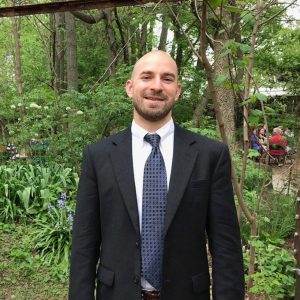
To ensure that DRBU’s growing student body receives sufficient guidance and care, the University’s leadership initiated a search this spring for two new faculty members. After a careful selection process, Drs. Peter Moore and Fedde de Vries joined the DRBU faculty. We are thrilled to welcome them. This month we are excited to feature Dr. Moore, who told us a little about himself and his story. Keep an eye out for our feature with Dr. de Vries in the near future.
Dr. Moore, can you tell us a bit about your background and your academic work?
Since my undergraduate years, my main academic training and work has been in Western philosophy. However, I attended institutions that valued the history of philosophy and encouraged students to be generally well-read. At that time I also studied modern Greek literature and language, which eventually segued comfortably into my graduate work in ancient Greek philosophy. As a result, I acquired an education in a wide range of historical periods and thinkers, as well as a sense that by studying and practicing philosophy, one is participating in a dialogue with great minds of the past.
My graduate degree is in ancient Greek philosophy, with a focus on Plato’s moral and political philosophy. In my dissertation I developed a reading of the Republic as a work of protreptic, or a literary form that can “turn the soul.” This project involved a careful analysis of both Plato’s argument for the superiority of the just life to the unjust life as well as the features of the dialogue form that can make this argument maximally persuasive to a reader. In recent years I have presented on a variety of topics at conferences for ancient philosophy, but one topic of particular interest to me is the role of mathematics in Plato’s philosophy.
How did you find out about DRBU? Why did you want to join the faculty?
My introduction to DRBU was quite fortuitous, because I wasn’t even aware of the university’s existence until just a month before the deadline for the job application. A friend of mine whom I had met at a Dharma center that I was attending in Cincinnati told me that he had moved to Ukiah to study in the master’s program and informed me about the job opening. After I visited the website and read more about the curriculum and the ethos of the institution, I was immediately interested in the position. I was especially impressed by the commitment to shared inquiry as a method for accessing the wisdom of the texts in a “great books” program. Moreover, I had been practicing meditation and attending various Dharma centers for about eight years in Lexington and Cincinnati, so the idea of a pedagogy that utilizes meditation and other contemplative exercises appealed to me. The curriculum’s presentation of Buddhist classics as serious philosophical texts in their own right also appealed to me. In connection with this, I was also impressed by the attention and care given to the development of the curriculum, which encourages dialogue between classics of Eastern and Western philosophy (broadly construed).
What has your experience at DRBU been like so far?
One thing that I’ve noticed at DRBU is that there is never a dull day—and I mean this in the best sense possible! The shared inquiry model makes the classroom much more enjoyable because it allows insights and questions to arise spontaneously, so you can never predict what kinds of questions or conversations will occur in class. So my experience in the classroom at DRBU has been very enjoyable. I’ve also greatly appreciated my colleagues, both for making me feel welcome as a peer at the University, and for their willingness to engage in philosophical dialogue. I particularly enjoy the feeling that there is always something new that I can learn from my colleagues.
What are you looking forward to at DRBU?
I’m looking forward to acquiring a deeper understanding of the non-Western traditions of philosophy and spirituality that inform the curriculum at DRBU. My experience with fellow faculty members has shown that our conversations are enriched by the expertise that we each bring from our diverse fields of study. As a more long-term interest, I am also excited about the possibility that a renewed sense of the purpose of the Humanities and Liberal Arts might emerge from DRBU at a time when humanity seems to need it the most.